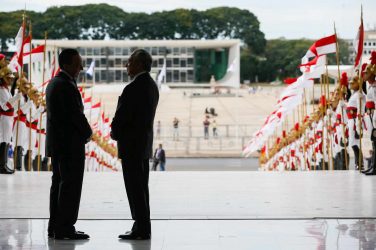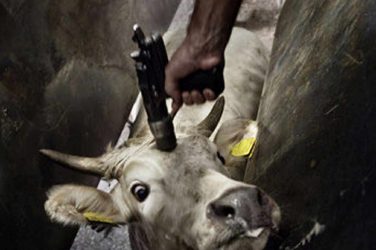As the pullout from Afghanistan unfolds into new geopolitical prospects for its powerful neighbors, the U.S. has once again centralized what it envisions for South America at State level. George W. Bush had inadvertently outsourced policy for the southern continent to then president Luiz Inácio “Lula” da Silva. In turn, Obama made it an affair of NSA surveillance, as Edward Snowden later revealed. Trump chose instead to bring the continent to heel by privatizing it through his own clones of approval. Biden’s difference is to do it in the name of the welfare of the folks back home.
The return of State-centralized operations for South America, and Brazil above all, can already be felt. The compromised anti-corruption and extra-judicial court of exception, Operation Lava Jato, had the prints of the DOJ on it from its creation in March, 2014. It is now known that classified information was funneled to its “task force” to wrench plea bargains from some of the country’s most powerful industrial executives. Exemption from embezzlement charges, both in the U.S. and abroad, was the tally for helping to indict political leaders of the Workers’ Party (PT) on corruption charges. Failing that, as fresh reports have revealed, arrangements for the purchase of Pegasus would do as well.
With the visit of CIA director William J. Burns and more recently National Security Advisor Jake Sullivan to the southern continent, critics of the Bolsonaro regime who invested diplomatically and emotionally in a Biden victory have had to come to terms with reality. Biden’s staff will not belittle the far-right military government’s worn out Cold War rhetoric of fighting communism after all. The communist threat, warranting submission of Brazil’s dominant sector to the interests of the U.S., does exist after all – and it comes from Asia.
President Xi Jinping has repeatedly asserted his realignment of China’s political economic structure and policy planning with the principles of Maoism, whether neoliberal ideology is willing to concede that or not. Not that such short-sightedness reduces neoliberalism to a mere effect of parallax, though. The Maoist model is the first to admit how class struggle festers within the Chinese Communist Party and the last to claim it brings History to its end. Still, not even the mutual contempt the American and Brazilian presidents have for each other can revert what has merged into a common mission against China’s promise for South America.
The centralization of operations at the State level could also be felt at the last G7 summit. In its first in-person meeting since the beginning of the pandemic, Jair Bolsonaro was nowhere to be seen – granted nor was any other non-G7 head of state. While pundits are having a field day speculating over the shape of the post-pandemic economy, the G7’s insularity is all but suggestive of the changing times. As far back as the 1990s, its brand name had been loosening its grip. By the end of the century, after the GATT had become the WTO, an international free trade zone for the Americas was in the works.
As if to stimulate convictions that Empire had now become an ideal communications community, the G7 even opened a flank to absorb Russia. A further metamorphosis had the 7 bud into the G20. For a brief period, capital accumulation and wealth concentration started rippling outward in ways other than through IMF bailouts. The capitalist inflection in China had seemed to project the next phase.
Shortly into the current century, Brazil seized a window of opportunity to spark its own G group. Celso Amorim, foreign Minister during Lula’s two terms in office, had previously led his country’s team of negotiators at the WTO summits. In those broad discussions on the future of globalization, Amorim created lasting ties with the Chinese delegation.
With the U.S. scrambling to locate weapons of mass destruction in Saddam Hussein’s Iraq, George W. Bush divested interest in Latin America at a scale few if any previous resident of the White House had done. Brazil proved to be a trustworthy player on the commercial and diplomatic levels. It was given leeway to increase trade with China. Bush even attempted to use Lula’s clout in formerly non-aligned countries to repair the U.S.’s shattered image following the serial atrocities committed in Iraq.
The pieces were set for the creation of the BRICS, the new trade zone of economic cooperation between Brazil, Russia, Iran, China, and, later, South Africa.
THE POWER OF BRICS
That China would have even needed Brazil in what was a cooperative organization focused on commodity extraction underscores the crucial importance of the South American giant as a global feeder. Soya grew into yet another of Brazil’s historic monocultures after sugar, gold, coffee, rubber and citric products. Soya seemed tailored-made for mass exportation to its Asian partner. Until then, China’s primary interest in Brazilian natural resources was iron ore. Its need was so great China even complied to build steel mills on Brazilian territory in exchange for reserved megashares of the ore.
The BRICS was a successful deal for Brazil, with its economic growth spearheading to 7.5 percent in 2010. By absorbing even Chavez’s Venezuela, Lula dreamt of broadening the MERCOSUL economic community into a transcontinental trade organization, one predating President Xi Jinping’s Belt and Road initiative. The backlash from the North was soon to come. Prior even to the 2018 detention of Huawei’s CFO, Ms. Meng Wanzhou, in Vancouver, Lula’s successor President Dilma Rousseff was ousted by a congressional coup d’état. Once that occurred, the BRICS was jettisoned.
What had given popular momentum to the coup stemmed from the exaggerated effects on the economy of the downturn in the commodities market. Brazil and Venezuela’s euphoria from oil production waned as a result. To foster instability, what was a bump in 2015’s first quarterly results was portrayed as a nosedive. Corporate media pulverized public opinion and economic confidence once Rousseff was invested in 2015 for her second term in office.
Pulses of fear regarding an impending recession were triggered, thereby pressuring Rousseff to scramble her domestic economic policies after her re-election campaign had been run on social change – made viable precisely from commodity-based revenues. Her measures to force private banks to shrink interest rates and electricity transmitters to slash fees ended up breaking the back of her coalition government. Meanwhile the Armed Forces’ four-star generals plotted to shut down the Truth Commission into military violence during the 1964-1985 dictatorship and unconstitutionally initiated their return to government.
By then, Xi Jinping had taken power and the leaked (and apparently legitimate) “Document 9” proved the BRICS to be outdated. Throughout the first decade of this century, China and Brazil had played musical chairs trading 6th and 7th positions in the yearly nominal GDP ranking. What later gave China its overpowering impetus was the 2007-8 Western financial meltdown.
Where China was able to keep Western banks afloat, it fell short of reverting their wrongdoings, even in take-over cases like HSBC. Not only were no financial executives indicted for the fraudulent practices leading up to the crisis, reforms led G7 finance ministers to strip labor costs and hedge recovery on intensified accumulation of capital and wealth concentration at a scale not seen since the early twentieth century.
Across the Pacific Ocean, Xi Jinping had a different vision for his country. Its economic planning set about to eradicate first misery and then poverty through broader distribution of China’s incredible returns. But its economic prosperity shook the image of communist integrity by producing over 600 billionaires, just shy of the U.S.’s 700, according to Forbes’s 2020 count.
Meanwhile in Brazil, measures to destroy wealth redistribution mechanisms have already done their deed. Although serving the interests of mega capital, who runs the power structure now are Brazil’s 17 four-star generals. Despite the BRICS’ fall from grace, China remains Brazil’s second most important trading partner. The blockage against Huawei and sabotage of the CoronaVac vaccine makes it plain the U.S. intends it to remain as such. In exchange, Brazil’s ultrarich class has grown to seventh worldwide, with over 80 billionaires reaping the riches from the privations in course and guaranteeing the country’s fame as one of the most unequal on the planet.
China’s two continental-sized trade agreements signed earlier this year the RCEP with Asian countries and the EU-China trade deal, include no Latin American countries. Regarding Brazil, China remains a mass importer of natural resources and agro-meat products, merely the most counter-productive contributions it can make to overhaul the neo-colonial nature of the domestic economy.
There again, preventing China’s reputation from growing in South America is part of the equation. If Chinese 5G telecommunications and high technology can be fended off, Biden seems willing to allow Brazil’s generals to shower themselves with the privileges of a cast and its billionaires to raise their bounty by massively indebting the population, thereby stripping it from access to public services even as basic as education.
THE STRUGGLE FOR COMMUNISM
The centenary of the Chinese Communist Party in Beijing on July 1st had President Xi Jinping follow in the footsteps of Mao Zedong as he had earlier managed to do with Karl Marx himself. What the post-BRICS era can offer with growing Chinese influence in South America arises from massive poverty reduction and strict measures against deforestation.
As much as a radical reform of tax policy and a universal basic income might make progressives dream, 85 percent of Brazilians are unaffected by changes to taxation, whether it be income, corporate, property or inheritance taxes. Much of the remaining 15 percent are prepared to go to any length and use any means to maintain the country’s regressive policies.
Without reining in the billionaires, in ways similar to what China itself is doing, continental prospects for reforming the fiscal structure can lead only to deepening South America’s backyard status. Hopes for reverting this scenario through elections or peaceful means equates to self-denial. However, a bona fide escape from the backyard lies through the Belt and Road. For that to happen, the continents’ left-of-center intelligentsia has to stop hating China, indeed hating a China that creeps mainly in their darkest fantasies.
Five years after the 2016 Coup, anywhere from a quarter to a third of Brazilians awake without knowing where to find food. The country is seeing the most violent upward transfer of wealth in its history. Some estimates suggest the average Brazilian family carries a debt load accounting for some 76 percent of monthly income.
As China ponders whether Belt and Road can be ushered into the continent without military escort, Brazil, Colombia, Uruguay and even Venezuela’s pro-Guiado business clan, have leapt toward privatizing anything in reach. Their bet is that by ridding the State of public property they can prevent predictable popular uprisings from morphing into a springboard for Chinese expansion into the continent.
Poverty-reduction may well turn out to be Xi Jinping’s strongest asset abroad. Even for G7 populations, freedom and democracy now sound hollow. The psychological and emotional depression limitless behavioral data extraction provokes has mainly favored the rise of far-right authoritarian figures. Even the myth of the uberized entrepreneur is bottoming out in Brazil as out-of-control gasoline pricing forces drivers off the roads. The place to turn for Brazilians might well become China – provided it is not already.
Norman Madarasz is professor of critical political philosophy and non-canonical literature, and teaches in Brazil. He is the author of Obstruções à justiça: dívida, sexo, estética pós-punk e outros small data da filosofia contemporânea. Porto Alegre: Editora Fi, 2017.





